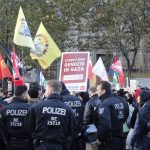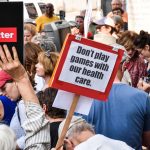This part of Mobilizing for Democracy addresses eventful democratization, focusing on how transformative events influence strategic interactions among political actors and shape public debates over contentious issues. The focus is on the Charlie Hebdo shooting that took place in Paris in January 2015, which we consider as a critical juncture that affected the content and nature of public debates on the accommodation of cultural and religious diversity in Western European societies. This part of the research is built upon two main theoretical axes: on the one hand, we refer to literature on the impact of transformative events, investigating how these shape environmental opportunities, allocation of resources, and ultimately the strategic interaction among actors. Critical junctures are turning points that pave the way for changes and may have long-lasting effects on the relations that are established in new assets or regimes. On the other hand, in this research we aim to account for the degree of deliberativeness of various public spheres in the aftermaths of the Charlie Hebdo attacks: our goal is to investigate to which extent, through which mechanisms and under which circumstances, transformative events trigger deliberation or rather polarization in the public spheres.
The research design is based on a small N cross-national comparison (France, Denmark, Germany, Italy and the U.K.), which bridges most similar and most different research design. Within a most similar research design, we focus on the impact of different citizenship regimes and religion-state relations; within a most different research design, we look at how robust causal mechanisms work in -the different cases, focusing on brokerage, agenda setting, embeddedness, transnationalism, adaptation and deliberativeness. Yet, the comparative design is not limited to comparisons across country cases and over time (covering the first anniversary of the shooting in January 2016), but also addresses several public spheres, comparing the unfolding of public debates in mainstream media to subaltern and social movements’ public spheres. In so doing, we aim to analyse the interactions among institutional and civil society actors in different fields and across the multiple issues related with the Charlie Hebdo attacks: migration and integration, secularism and cultural and religious diversity, security and civil rights.
From the methodological point of view, the research is based on a triangulation of quantitative and qualitative analysis. The first part of the research focuses on coverage, and it will use quantitative claims analysis to interpret media discourse in one mainstream quality newspaper in each country case. In addition to this, we will conduct qualitative framing as well as discourse analysis of web platforms, websites, speech acts and selected online material produced by different types of nationally based social movement actors. In this way, we will look at the responses to transformative events in social movements’ spheres focusing on the discursive activity and strategic action of 1) radical left groups, 2) radical right groups, 3) migrant organizations, 4) civil right groups, 5) religious organizations.
Researchers who contributed to this part
01/07/2024

14/06/2024

10/06/2024

03/06/2024

17/05/2024

21/03/2024

Journal Article - 2023
Journal Article - 2023
Journal Article - 2023
Journal Article - 2023
Monograph - 2023
Monograph - 2022
Monograph - 2022
Journal Article - 2021
Monograph - 2021
Journal Article - 2021